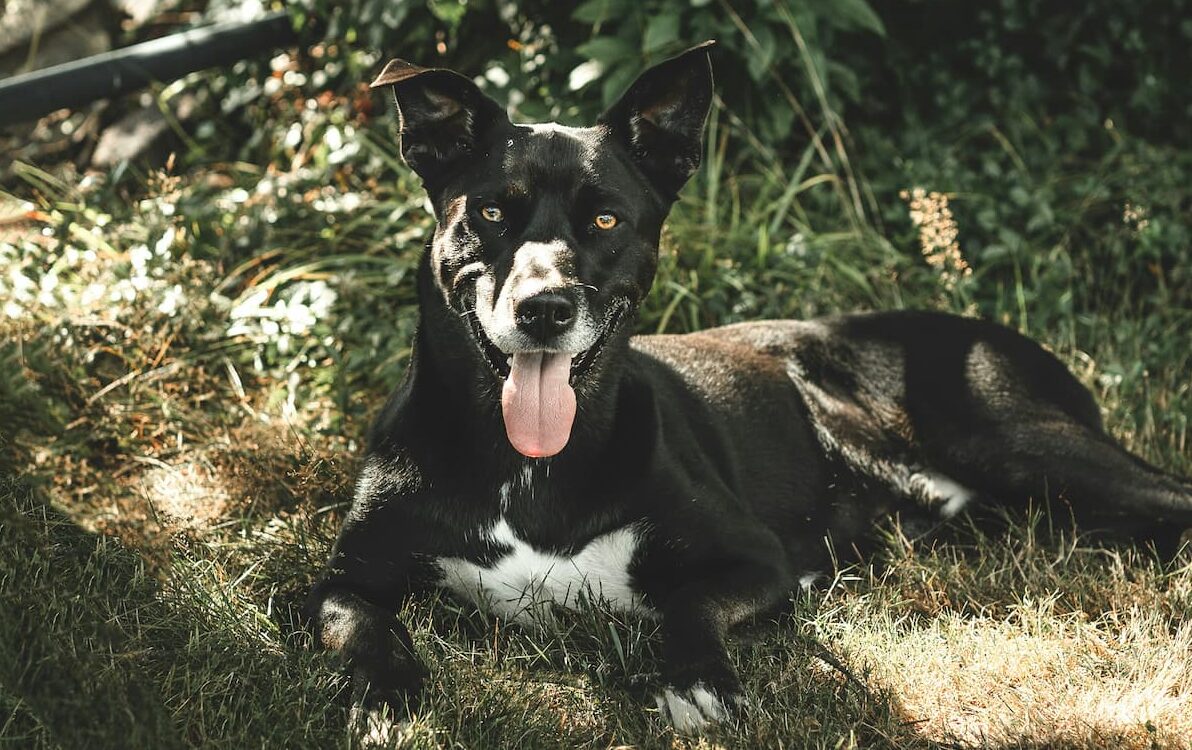Have you ever found yourself awake in the wee hours of the night, your eyes heavy with sleep, only to be interrupted by the rhythmic sound of heavy breathing coming from your furry companion?
Picture this: you’re curled up under your cozy blanket, entirely unaware of the nocturnal secrets your four-legged friend is about to share.
As the night falls, you might find yourself wondering why do dogs pant at night?
Read on to find the answers to this nocturnal question.
Why Do Dogs Pant at Night?
During those warm summer nights, you may have noticed your furry friend panting away, seemingly unable to cool down.
But have you ever wondered why dogs pant at night?
There are several reasons why our canine companions engage in this behavior when the sun goes down:
Understanding the Natural Cooling Mechanism of Panting
Firstly, panting is a natural way for dogs to regulate their body temperature.
Dogs don’t sweat like humans do.
Instead, they rely on panting to dissipate heat and cool down, especially when their environment is warm or humid.
Just like humans, dogs have a normal body temperature, and panting helps them keep it within a safe range.
When dogs pant, they take rapid and shallow breaths, allowing them to exchange warm air from their lungs with the cool air outside.
This evaporates moisture from their tongues and upper respiratory tract, effectively dissipating heat from their bodies.
Panting is a dog’s way of sweating, as they don’t have sweat glands like humans do.
By panting, dogs release excess heat and maintain a comfortable body temperature.
There are a few reasons why dogs might pant more at night:
Firstly, the temperature tends to drop during the night, making it easier for dogs to cool down through panting.
Additionally, during sleep, dogs may experience dreams or intense physical activity in their dreams, causing their body temperature to rise.
This prompts them to pant in order to bring their temperature back to normal.
Being in a warm or stuffy room can also make dogs pant more at night, as they struggle to regulate their body temperature.
Therefore, ensuring a cool and well-ventilated sleep environment for your furry friend is crucial.
Remember, panting is a natural cooling mechanism for dogs, especially when they are hot or need to regulate their body temperature.
It’s essential to provide them with a comfortable environment and plenty of fresh water to drink.
So, the next time you see your dog panting at night, you’ll now have a better understanding of why they do it – they’re simply trying to keep themselves cool and comfortable.
Potential Causes of Excessive Panting in Dogs During the Night
Excessive panting in dogs at night can be concerning for pet owners, as it may indicate an underlying health issue.
While panting is a natural way for dogs to cool down, if it becomes excessive or occurs during the night, it could be a sign that something is amiss.
Here are some potential causes to consider:
1. Overheating: Dogs regulate their body temperature through panting, and this can sometimes be more pronounced when they’re feeling too warm.
Ensure that your dog’s sleeping area is well-ventilated and that they have access to fresh water throughout the night.
If your dog is panting excessively at night and seems uncomfortable, it’s important to monitor their temperature and seek veterinary attention if necessary.
2. Anxiety or Stress: Dogs, like humans, can experience anxiety or stress that may cause them to pant more than usual.
Throughout the day, our furry friends may experience various triggers that cause them to feel anxious.
This could include being left alone, loud noises, or even changes in their routine.
Providing a calm and comfortable sleeping environment for your furry friend may help alleviate their stress.
Consider using a cozy bed, calming music, or even a pheromone diffuser to create a more soothing atmosphere.
3. Pain or Illness: Panting can also be a way for dogs to communicate that they’re in pain or feeling unwell.
If your dog is panting excessively at night and shows other signs of discomfort, such as restlessness, decreased appetite, or lethargy, it’s crucial to take them to a veterinarian for a thorough examination.
Various medical conditions, including heart disease, respiratory problems, or even certain medications, could be the root cause of their nighttime panting.
Remember, each dog is unique, and what may cause excessive panting in one dog may not apply to another.
If you’re worried about your dog’s nighttime panting, it’s always best to consult with a qualified veterinarian who can evaluate your pet’s specific situation and provide appropriate guidance.
Common Health Issues That Can Trigger Nocturnal Panting in Dogs
Panting is a way for dogs to cool themselves down when they feel overheated, but when it happens during the night, it might indicate an underlying health problem.
One potential cause of nocturnal panting in dogs is respiratory issues.
Dogs with respiratory problems may struggle to breathe properly, especially when lying down, leading to increased panting.
Conditions such as asthma, bronchitis, or even kennel cough can disrupt a dog’s breathing, making them pant more during the night.
Another common health issue that can trigger nocturnal panting in dogs is heart disease.
Just like humans, dogs can suffer from various heart conditions.
When a dog’s heart struggles to pump blood efficiently, it can cause fluid buildup in the lungs, leading to difficulty breathing and excessive panting, particularly at night.
Heart disease demands special attention and treatment, so it’s crucial to consult your veterinarian if you suspect this may be the cause.
How to Create a Comfortable and Calm Sleeping Environment for Your Dog
Here are some tips to reduce your dog’s nighttime panting:
1. To ensure your dog stays cool and comfortable during the night, consider creating a designated sleeping area that is away from direct sunlight and drafts.
Providing your dog with a cooling pad or elevated bed can also help regulate their body temperature.
Additionally, make sure they have access to fresh water throughout the night to stay hydrated.
2. To help ease their anxiety and create a calm sleeping atmosphere, consider using pheromone diffusers or calming sprays in their sleeping area.
Additionally, providing them with a safe and cozy den-like space, such as a crate or a designated area with their favorite toys and blankets, can help them feel secure and relaxed during the night.
3. It’s essential to pay attention to your dog’s overall health and well-being.
Certain medical conditions, such as respiratory issues or pain, can cause increased panting during sleep.
If you notice that your dog is panting excessively or exhibits other worrying symptoms, it’s crucial to consult with a veterinarian who can diagnose any underlying health issues and provide appropriate treatment.
Remember, a healthy and contented dog will have a much better chance of enjoying a restful sleep.
By understanding why dogs pant at night and implementing these simple tips, you can improve your furry friend’s sleep quality and promote their overall well-being.
Remember, a well-rested dog is a happy and healthy dog!
So, create a calming sleep environment, keep them cool and comfortable, and seek veterinary advice if necessary.
Your loyal companion will thank you with a wagging tail and peaceful slumbers.
FAQ
Q: What’s up with dogs panting at night anyway?
A: Ah, the age-old mystery!
Typically, dogs pant to regulate their body temperature.
During the day, it’s normal for them to pant a bit, especially if it’s warm outside.
However, at night, when the sun has gone to sleep, we humans might find it a bit odd.
There can be a few reasons behind this nocturnal panting.
Q: So, why do they feel the need to regulate their temperature at night?
A: Great question!
Dogs don’t have the luxury of kicking off their fur coats like we can strip off a sweater.
They rely on other means to cool down, such as sweating through their paw pads and, you guessed it, panting!
Panting helps evaporate moisture from their tongue and respiratory tract, allowing them to cool off.
Q: Are there specific reasons why panting occurs at night?
A: Indeed, there are a few factors that might trigger nighttime panting.
One common reason is anxiety or stress.
Just like humans, some pups can get anxious during certain situations or when they’re not feeling their best.
This anxiety can manifest itself through panting, even amidst the darkness of night.
Q: So, what can cause dogs to feel anxious at night?
A: Ah, the possibilities are endless.
Thunderstorms, fireworks, unfamiliar surroundings, or separation anxiety can all contribute to a restless, anxiety-filled night for our four-legged friends.
It’s their way of communicating their discomfort to us, their ever-attentive companions.
Q: Is there anything we can do to help them feel more at ease?
A: Absolutely!
First and foremost, it’s essential to identify the source of their anxiety.
For example, if fireworks make Fido fretful, creating a safe space for them to retreat to, such as a comfortable room with soft lighting and familiar scents, can work wonders.
Additionally, playing calming music or leaving an item with your scent nearby may provide comfort and reassurance.
Q: Are there any other reasons why dogs pant at night?
A: Glad you asked!
Sometimes dogs may pant at night due to medical conditions.
Certain illnesses, pain, or respiratory problems can make our furry companions pant more frequently, including during the nighttime.
If you notice a sudden change in your dog’s panting behavior or suspect an underlying health issue, it’s always wise to consult with your veterinarian.
Q: So, should I be worried if my dog pants at night?
A: Not necessarily!
It’s crucial to pay attention to your pet’s overall behavior and monitor any changes.
If their panting is accompanied by other signs of distress or discomfort, it might be worth investigating further.
However, if your dog appears calm, healthy, and generally at ease, the panting may just be their way of staying cool and communicating with you.
Q: Got it!
So, in a nutshell, dogs pant at night to regulate their body temperature, deal with anxiety, or due to medical reasons, right?
A: Absolutely!
Our furry friends pant at night for a myriad of reasons – whether it’s to cool themselves down, express unease, or signal a health concern.
Understanding their unique needs and providing them with a supportive environment can go a long way in ensuring their comfort during those mysterious pant-filled nights.
In Conclusion
So there you have it, folks!
The reasons why our beloved four-legged friends pant at night.
From their innate cooling mechanism to their dream-filled adventures, it’s all part of being a dog!
Next time you see your furry companion panting away in the darkness, don’t fret.
Remember, their unique panting behavior is simply their way of regulating their body temperature and letting you know they’re perfectly fine.
Whether they’re chasing squirrels and rabbits in their dreams or just trying to cool down after a long day of tail wagging, dogs have their own nocturnal habits that make them the intriguing creatures we love unconditionally.
So tonight, when you tuck yourself into bed and notice the rhythmic sound of your dog’s panting beside you, take a moment to appreciate the wonders of nature and the bond you share, knowing that your canine pal is just doing what comes naturally.
After all, they are our loyal, furry companions, and their panting at night is just another piece of the puzzle that adds to the magic of having a dog in our lives.














